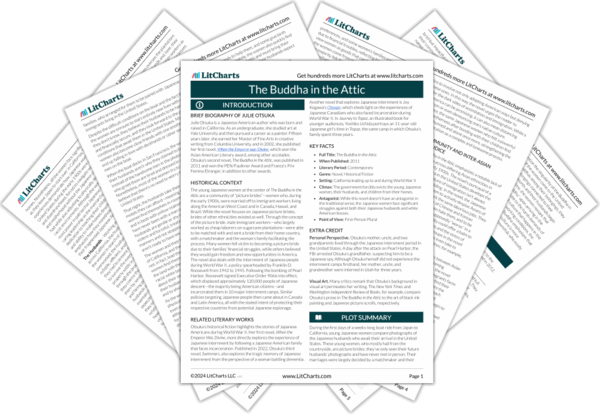The Japanese American Children Quotes in The Buddha in the Attic
We gave birth at five in the morning […] and that night our husband began kissing us in bed. I said to him, ‘Can’t you wait?’ We gave birth quietly, like our mothers, who never cried out or complained […] We gave birth easily, in two hours, and then got a headache that stayed with us for five years.
We gave birth but our milk never came in and after one week the baby was dead. We gave birth but the baby had already died in the womb and we buried her, naked, in the fields, beside a stream, but have moved so many times since we can no longer remember where she is.
They ate at the table like grown-ups. They never cried. They never complained. They never left their chopsticks standing upright in their rice. They played by themselves all day long without making a sound while we worked nearby in the fields…And whenever we tried to pick them up and carry them home they shook their heads and said, ‘I’m too heavy’ or ‘Mama, rest.’
They were silent, weathered men who tramped in and out of the house in their muddy overalls muttering to themselves about sucker growth, the price of green beans, how many crates of celery they thought we could pull this year from the fields. They rarely spoke to their children, or even seemed to remember their names.
They gave themselves new names we had not chosen for them and could barely pronounce […] Many called themselves George. Saburo was called Chinky by all the others because he looked just like a Chinaman. Toshitachi was called Harlem because his skin was so dark.
They pulled on their overalls in the countryside and helped us prepare for the harvest one last time, for we had been ordered to till our fields until the very end. This was our contribution to the war effort, we were told. An opportunity for us to prove our loyalty. A way to provide fresh fruits and vegetables for the folks on the home front.
There was a girl who left knowing she would have been valedictorian at Calexico High. They were children who left still baffled by decimals and fractions […] There was a boy from Hollister who left carrying a white feather in his pocket and a book of North American birds given to him by his classmates on his last day of school […] There was a girl from Caruthers who left dragging a jump rope behind her of which she refused to let go.

The Japanese American Children Quotes in The Buddha in the Attic
We gave birth at five in the morning […] and that night our husband began kissing us in bed. I said to him, ‘Can’t you wait?’ We gave birth quietly, like our mothers, who never cried out or complained […] We gave birth easily, in two hours, and then got a headache that stayed with us for five years.
We gave birth but our milk never came in and after one week the baby was dead. We gave birth but the baby had already died in the womb and we buried her, naked, in the fields, beside a stream, but have moved so many times since we can no longer remember where she is.
They ate at the table like grown-ups. They never cried. They never complained. They never left their chopsticks standing upright in their rice. They played by themselves all day long without making a sound while we worked nearby in the fields…And whenever we tried to pick them up and carry them home they shook their heads and said, ‘I’m too heavy’ or ‘Mama, rest.’
They were silent, weathered men who tramped in and out of the house in their muddy overalls muttering to themselves about sucker growth, the price of green beans, how many crates of celery they thought we could pull this year from the fields. They rarely spoke to their children, or even seemed to remember their names.
They gave themselves new names we had not chosen for them and could barely pronounce […] Many called themselves George. Saburo was called Chinky by all the others because he looked just like a Chinaman. Toshitachi was called Harlem because his skin was so dark.
They pulled on their overalls in the countryside and helped us prepare for the harvest one last time, for we had been ordered to till our fields until the very end. This was our contribution to the war effort, we were told. An opportunity for us to prove our loyalty. A way to provide fresh fruits and vegetables for the folks on the home front.
There was a girl who left knowing she would have been valedictorian at Calexico High. They were children who left still baffled by decimals and fractions […] There was a boy from Hollister who left carrying a white feather in his pocket and a book of North American birds given to him by his classmates on his last day of school […] There was a girl from Caruthers who left dragging a jump rope behind her of which she refused to let go.











